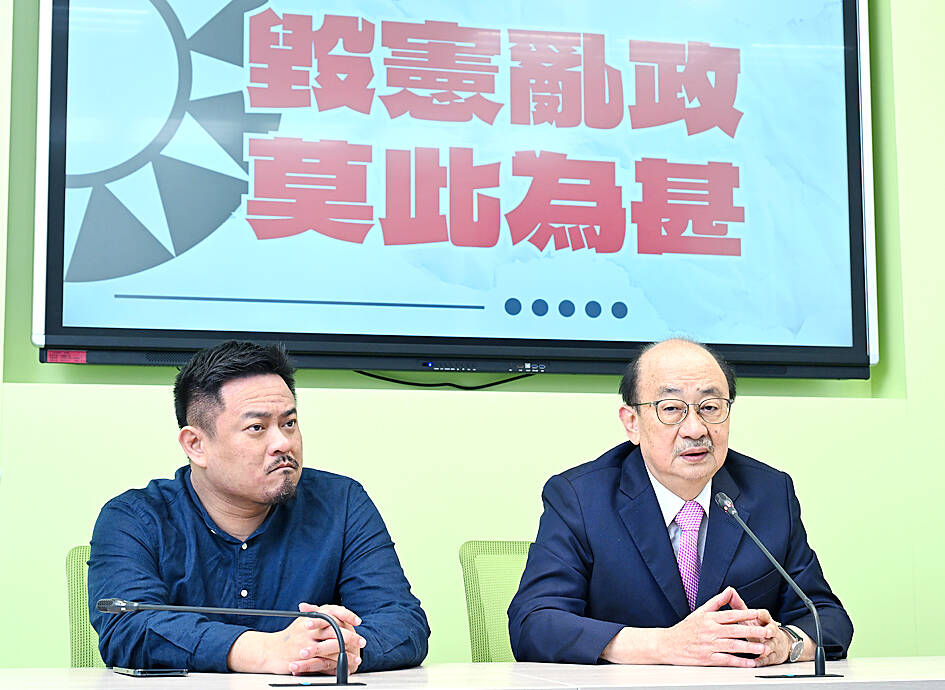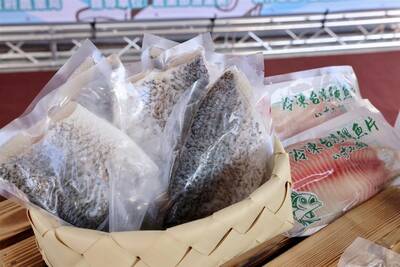The Chinese Nationalist Party (KMT) caucus yesterday proposed giving lawmakers the right to conduct investigations and hold administrative hearings as part of its pledge to reform the Legislative Yuan, but the Democratic Progressive Party (DPP) caucus said that it would destroy the Constitution and disrupt government operations.
KMT Legislator Lin Tzu-ming (林思銘), the KMT caucus’ secretary-general, said the Judicial Yuan’s Special Investigation Division, which ceased operations in 2017, should be reinstated so that lawmakers could effectively oversee the executive branch.
The division could improve the prosecutorial system and maintain the system’s neutrality, and ensure that crimes are investigated more efficiently, Lin said.

Photo: Liao Chen-huei, Taipei Times
However, before the division resumes operations, the legislature should create its own special task force for investigations and hearings, Lin said.
“The legislature’s investigation task force would be different from the Special Investigation Division and would not be against the Constitution. Prosecutors serving in the Special Investigation Division would be selected by the Supreme Prosecutors’ Office to investigate cases, while lawmakers in the special investigative task force would simply exercise their constitutional right to investigate potential illegalities as the executive branch and hold administrative hearings,” Lin said.
“We will propose an amendment to the Act Governing the Legislative Yuan’s Power (立法院職權行使法) to legalize the establishment of the special investigative task force,” he added.
KMT Legislator Wu Tsung-hsien (吳宗憲), formerly a prosecutor and New Taipei City Legal Affairs Department director, said that legislators should be given rights to investigate and hold hearings before the Special Investigation Division resumes operations through an amendment to the Court Organization Act (法院組織法).
“Government officials attending the administrative hearings at the legislature must not give false testimonies or risk committing perjury,” he said. “After a case is thoroughly investigated by lawmakers, they can turn the evidence over to the prosecutors for further investigation.”
The right to conduct an investigation is perceived worldwide as a right of legislators that does not contradict the constitutional principle about separation of powers, Wu said, adding that it would not vastly expand the rights of the legislative branch.
Prosecutors have the ultimate authority to decide whether they should press charges against individuals or organizations, he added.
DPP caucus whip Ker Chien-ming (柯建銘) criticized the KMT caucus’ proposal, saying that it would destroy the Constitution and disrupt government operations.
“Although the Constitutional Court in 2004 ruled that the legislature has the right to conduct investigations, no lawmakers have yet to propose amendments to regulations, as it could conflict with the right to conduct investigations held by Control Yuan members,” Ker said.
As there are still difficulties in distinguishing between the two branches’ investigative authorities, no one has dared propose any change to the Act Governing the Legislative Yuan’s Power, “fearing it could turn the legislature into a monster,” he said.
“Both the KMT and Taiwan People’s Party support the proposal that lawmakers should be given the right to hold hearings, as US congressional members do. However, such a system is unconstitutional in Taiwan,” Ker said. “If their proposal was implemented, government officials could face criminal punishment if they try to dodge questions from lawmakers, counter-interrogate or lie to them.”
DPP Legislator Rosalia Wu (吳思瑤), the DPP caucus secretary-general, said many judicial experts have reservations about reinstating the Special Investigation Division, as politicians could use it to persecute dissenters.
“The KMT claims that their proposal would empower legislators in their ability to investigate scandals. However, legislative authorities must not transcend or even replace those in the judicial branch. The Constitution remains the bottom line,” she said.

Taiwan's Vice President Hsiao Bi-khim (蕭美琴) said Saturday that she would not be intimidated by the Chinese Communist Party (CCP), following reports that Chinese agents planned to ram her car during a visit to the Czech Republic last year. "I had a great visit to Prague & thank the Czech authorities for their hospitality & ensuring my safety," Hsiao said on social media platform X. "The CCP's unlawful activities will NOT intimidate me from voicing Taiwan's interests in the international community," she wrote. Hsiao visited the Czech Republic on March 18 last year as vice president-elect and met with Czech Senate leadership, including

There have been clear signs of Chinese Communist Party (CCP) attempts to interfere in the nationwide recall vote on July 26 in support of Chinese Nationalist Party (KMT) legislators facing recall, an unnamed government official said, warning about possible further actions. The CCP is actively involved in Taiwanese politics, and interference in the recall vote is to be expected, with multiple Chinese state media and TAO attempts to discredit the Democratic Progressive Party (DPP) and undermine public support of their recall movement, the official said. This interference includes a smear campaign initiated this month by a pro-Beijing Hong Kong news outlet against

A week-long exhibition on modern Tibetan history and the Dalai Lama’s global advocacy opened yesterday in Taipei, featuring quotes and artworks highlighting human rights and China’s ongoing repression of Tibetans, Hong Kongers and Uighurs. The exhibition, the first organized by the Human Rights Network for Tibet and Taiwan (HRNTT), is titled “From the Snowy Ridges to the Ocean of Wisdom.” “It would be impossible for Tibetans inside Tibet to hold an exhibition like this — we can do it. because we live in a free and democratic country,” HRNTT secretary-general Tashi Tsering said. Tashi Tsering, a Taiwan-based Tibetan who has never

A first shipment of five tons of Taiwan tilapia was sent from Tainan to Singapore on Wednesday, following an order valued at NT$600,000 (US$20,500) placed with a company in the city. The products, including frozen whole fish and pre- cooked fish belly, were dispatched from Jiangjun Fishing Harbor, where a new aquatic processing and logistics center is under construction. At the launch, Tainan Mayor Huang Wei-che (黃偉哲) called the move a “breakthrough,” marking Taiwan’s expansion into the Singaporean tilapia market. Taiwan’s tilapia exports have traditionally focused on the United States, Canada, and the Middle East, Huang said, adding that the new foothold in